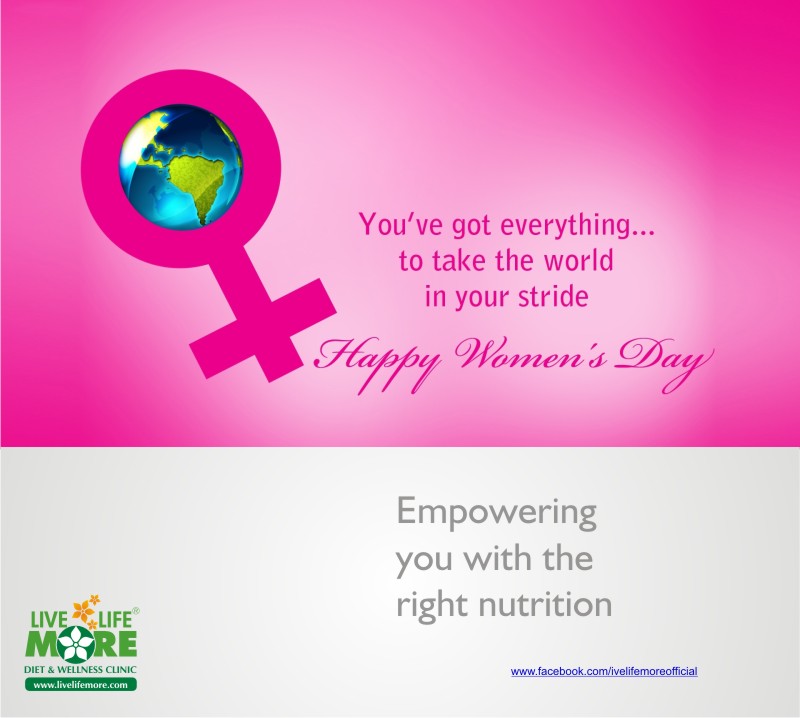 So, now you are done with the exchange of greetings on International Woman’s Day…here come the very best wishes laden with the information which can help women to stay healthy and fit and prevent nutritional deficiencies through practical little tips and hints…
So, now you are done with the exchange of greetings on International Woman’s Day…here come the very best wishes laden with the information which can help women to stay healthy and fit and prevent nutritional deficiencies through practical little tips and hints…
Do you keep yourself healthy with the right mix of vitamins?
Do you sometimes wonder, that should you pop pills or get the nutrients through the food you eat?
And my answer being a nutritionist is, “Keep up a balanced diet”. But supplements can be a good way to fill in the gaps when they happen.
Include Antioxidants
This is really simple. The antioxidant group includes vitamin A, vitamin C, and vitamin E.
What antioxidants do:
Antioxidants appear to play a role in protecting you from tiny particles your body makes, called free radicals, that can tear cells apart. Antioxidants may lower the risk of some health problems and slow aging. Antioxidants help boost the immune system, your body’s defense against germs.
How to include these Antioxidants in your daily diet:
1.Vitamin A: A nutrient that helps eyesight, soft tissue, and skin. You’ll find it in apricots, carrots, guava, kale, papaya, peaches, pumpkins, red peppers, spinach, and tomatoes.
2.Vitamin C heals wounds and helps your body make red blood cells. It also boosts levels of the brain chemical called nor-adrenaline, which makes you feel more alert and amps up your concentration.
Studies show that when you’re under a lot of stress, or as you get older, your levels of Vitamin C go down. You can get vitamin C from broccoli, grapefruit, kiwi, oranges, peppers, potatoes, strawberries, and tomatoes.
3.Vitamin E: It is also known as tocopherol. Your body needs it to keep cells healthy. It may slow signs of aging, too. But you raise your risk of bleeding if you take too much of it every day. You can get this nutrient in foods like margarine, corn oil, cod-liver oil, hazelnuts, peanut butter, safflower oil, sunflower seeds, and wheat germ.
Get an optimum dose of B Vitamins
All the B group vitamins are essential for you. But three of them — vitamins B6, B12, and folic acid — are especially important.
1. Vitamin B6 is also known as pyridoxine. You need it to keep your brain working well and to help your body change food into energy, which is called metabolism. Fish, potatoes, chickpeas, avocadoes, bananas, beans, cereal, meats, oatmeal, and poultry have good amount of vitamin B6.
2. Vitamin B12 is also important for metabolism, and it helps your body make red blood cells. You can get it from cheese, eggs, fish, meat, milk, and yogurt. Older adults, people with anemia, vegans, and vegetarians should work with a doctor to make sure they get enough of it.
3. Folate (folic acid). It helps build a healthy brain and spinal cord. It also makes DNA and RNA, the building blocks of cells, and prevents the changes in DNA that can lead to cancer. Adults and children need it to build normal red blood cells and prevent anemia. But it’s especially important for pregnant women because it helps prevent birth defects like spina bifida.
Foods high in folate include spinach and leafy greens, asparagus, citrus fruits, melons, strawberries, fortified grains, legumes, chickpeas, black beans, kidney beans, eggs, and liver.
Get ample Sunshine Vitamin- D
Vitamin D helps to move calcium and phosphorus, important minerals for keeping bones strong into your bloodstream. When your body doesn’t have enough vitamin D, it will take calcium and phosphorus from your bones. Over time, this makes them thin and leads to conditions like osteoporosis, which puts you at risk for fractures.
You can get vitamin D if you eat eggs and fish. Many middle-aged and older adults, though, might need to get what they need from “fortified” foods, which have the nutrient added by the manufacturer, or from supplements.
Because calcium and vitamin D are closely linked, sometimes it is recommended that older people, especially women who have been through menopause, take a supplement that has both nutrients if there is some serious deficiency or a metabolic disorder which hampers with the absorption.
Make bones healthy with Vitamin K
It plays an important role in keeping bones strong and helping blood clot for older people. The best food sources include green leafy vegetables, soybean oil, broccoli, alfalfa, cooked spinach, and fish oil.



